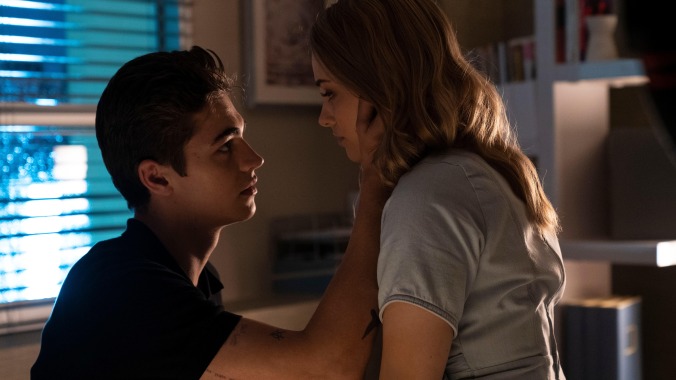After We Collided slides toward R-rated camp—but not far enough


Note: The writer of this review watched After We Collided from home. Before making the decision to see it—or any other film—in a movie theater, please consider the health risks involved. Here’s an interview on the matter with scientific experts.
Take away the vampires from Twilight or the BDSM from Fifty Shades Of Grey, and you’ve got the After franchise—a turgid romance about brooding British bad boy Hardin Scott (Hero Fiennes Tiffin) and his coquettish collegiate conquest, Tessa Young (Josephine Langford). Last year’s After played like a copy of a copy of a compelling teen drama, but it embraced just enough familiar romance tropes to earn it a legion of loyal fans. Now the sequel, After We Collided, hits Stateside after becoming something of a sensation in Europe, where its devoted fanbase helped it open to impressive box office numbers despite limited marketing, few reviews, and, you know, a global pandemic. American “Afternators” will no doubt be similarly pleased with this slightly campier continuation of the series. For everyone else, however, there’s not enough innovation to make the second installment a worthwhile jumping-on point.
After We Collided’s new tone comes courtesy of director Roger Kumble, who takes over the reins from Jenny Gage. Kumble attempts to position After We Collided as a sort of middle ground between the dark ironic camp of his 1999 hit Cruel Intentions and the Hallmark-esque charms of his recent Netflix rom-com, Falling Inn Love. After We Collided is more comedically self-aware than its predecessor, with scenes of madcap nudity and sexy yoga that occasionally capture some of the “so bad it’s good” energy that kept Twilight and Fifty Shades afloat. Unfortunately, the paper-thin plot and one-dimensional characters drag the whole thing back down.
While the first film tackled sexual awakenings, first love, and drama of the “Am I a fucking bet?” variety, After We Collided throws a new set of romantic clichés into the mix. Although Hardin and Tessa are on the rocks following the reveal that he initially pursued her solely to prove his powers of seduction, she agrees to a “fake dating” scenario when Hardin’s mom (Louise Lombard) comes to visit for Christmas. Tessa also falls into a bit of a love triangle with Dylan Sprouse’s Trevor, the adorably nerdy colleague at her improbably supportive new publishing job. Yet as with this year’s other teen romance sequels, To All The Boys: P.S. I Still Love You and The Kissing Booth 2, After We Collided is too invested in its central couple to know what to do with its new romantic rival. Which is a shame because Sprouse turns in one of the film’s livelier performances.
After We Collided’s other big hook is the fact that it’s an R-rated sequel to a PG-13 original. The new rating results in a whole lot of swearing, and more (although not necessarily more explicit) sex scenes. With little in the way of plot, After We Collided mostly functions as toothless teen softcore, which works better when it’s wryly comedic in the first half than earnestly sensual in the second. As Tessa and Hardin’s erotic encounters become less creative and more repetitive, they offer plenty of time to ponder the franchise’s confused continuity. Although only a month has passed since the events of the first film, this sequel has seemingly vaulted its college-aged characters straight into adulthood. One central dilemma is whether its protagonist—a 19-year-old halfway through her freshman year—should make a cross-country move for the job as a literary intern she started a week earlier.
There are just as many nits to pick about the film’s troubling sexual politics—from a retrograde “cat fight” between two young women to the seeming assertion that it’s perfectly fine for an adult businessman to encourage his company’s teenage intern to get drunk at a nightclub networking event. As in the first film, Hardin’s possessive, controlling tendencies are once again romanticized in concerning ways. (At one point he shows up to stop someone from “taking advantage” of Tessa when she’s drunk, and then proceeds to have sex with her himself.)
In the end, however, this series’ biggest problem isn’t that it’s problematic. It’s that it’s boring. The physical chemistry between Langford and Fiennes Tiffin isn’t enough to overcome the inertia of a lackluster script co-written by Anna Todd, who also penned the novels on which the series is based. Nor does the fact that this whole story started as One Direction fan fiction add much in the way of novelty to the finished product. With two more cinematic sequels already in development, the After franchise has clearly carved out its own thriving ecosystem amid an increasingly crowded teen romance market. But unless those sequels add some much-needed style or substance, it looks like that ecosystem will remain closed.